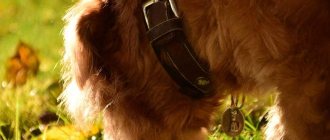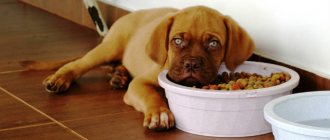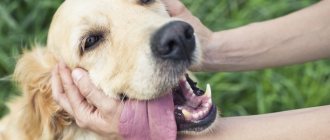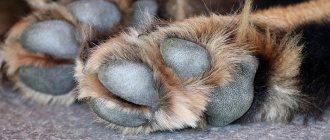If you have pets, chances are you know first-hand the challenges associated with caring for them. Dogs, for example, often scratch a bed or chair: right before they lie down in a comfortable soft place, they dig at it extensively and then lie down. They will paw, scratch, roll around on the bed, and even spin around frantically until they finally decide to just lie down.
Sometimes this behavior from your four-legged dog results in a simple scratch, and sometimes your cute new fleece-lined dog bed ends up in tatters. Having seen similar habits in my dog, my wife wondered: why does something like this happen? Indeed, how can this be explained? I am happy to share with you my own research on this topic.
The dog wants to make his “bed” softer
Professor Stanley Coren, who conducts neuropsychological research on the behavioral activity of dogs, has established a relationship between the degree of unevenness of the surface and the number of turns the dog makes before lying down. In the experiment, the behavior of sixty-two dogs was observed as they went to sleep on surfaces with different types of relief. The conclusion is clear - the longer the dog stomps on the bed, the more unevenness there is on the surface.
It turns out that the main meaning of the animal's circling is akin to shaking a sheet. These actions have one goal - to make the place where you spend the night comfortable for sleeping.
The distant ancestors of canines living in nature and their current wild relatives crushed the grass in this way and made the bed comfortable. At the same time, they scared away stinging living creatures - snakes, insects - from the place chosen for the bed.
Why did dogs walk in circles before lying down?
Sometimes her turning radius is as tight as her 3-by-2-foot dog bed in the winter, and others as wide as the spot against the fence outside in the summer. No matter what time of year it never fails to fascinate me as I watch my dog twirl around his chosen sleeping spot. What motivates her to spin before heading off to rest? Like my own personal bedtime rituals, walking in a circle creates a dog's comfort in several ways.
Long before dogs could snuggle up in our beds or had their own dog beds, circling was a means of providing safety and comfort. In nature, a chosen place around is one of the methods used by dogs to ensure the exclusivity of their sleeping place. Trampling on tall grasses or leaves creates enough disturbance to drive away any creatures that may be hiding there, such as the odd snake, rodent or insect.
Circles are also a safety measure. There are several little known or prominent features on a dog's paw pads. They are one of the few surface areas of a dog's body that have sweat glands. More related to this issue, dogs' paws also have scent glands. Taking a few turns around your preferred sleeping area—be it a spot of dirt or the right bed—means that the dog's scent notices. If you've ever seen an old Western movie where a group of pioneers "circle the wagons," a dog's curling may serve a similar protective function. This allows the dog to explore his area before settling down.
Attempts to free the anal sinuses
The physiological features of dogs suggest the presence of special glands called paraanal glands (anal sacs). Essentially, these glands are two small sacs that are located directly at the exit of the animal's anus. These glands secrete a special substance that is thick and has an extremely repulsive odor. Actually, the contents of the anal sacs consist of various bacteria, secretions of the sebaceous and apocrine glands. As a rule, the shade of the secreted secretion can vary from yellowish to brown.
Some mammals are able to release their anal sacs at will, mainly to mark something with their own scent or for self-defense, as the skunk does. Dogs have long lost the ability to empty these tonsils purposefully.
If the dog is completely healthy and no abnormalities are observed, the emptying of the paraanal glands occurs naturally during defecation. But if the sacs are overcrowded, they noticeably increase in size, then become inflamed and cause severe discomfort in the dog, including while walking. That is why sometimes owners can observe how the dog rubs its butt on the floor or ground, trying to get rid of the accumulated secretion. Associated symptoms of blockage of the paraanal glands are frequent licking of the anus and pressing it with the tail.
What does this mean?
If a dog rubs against the floor or ground in an attempt to clean out the glands, and the owner ignores this symptom, there is a chance that an abscess will form, which will eventually rupture as an abscess. Such incidents are usually very painful, moreover, naturally, the dog will stain everything that is nearby with the foul liquid.
It should be noted that such cases are not rare, but quite often they are mistaken for anal bleeding. If you detect the presence of an abscess in time, you should immediately consult a doctor - in such a situation only a specialist can provide assistance.
To dig means to mark
A very important nuance of dog psychology that every owner needs to understand. If a pet stubbornly digs the floor, blanket, mattress, she considers this item to be her sleeping property. Having scratched the blanket, the dog marks it and don’t be surprised if it tries to steal property or looks at you with an uncomprehending look when you once again pray to the dog gods. Scratching the floor, digging the bed, things, bedding - this is a “symptom” of infringement. Your pet has no property and is forced to appropriate what seems suitable to him.
Chasing the tail
It's funny to see your dog chasing his tail in circles. Often this action shows that your dog is in a good mood. However, repeated circular movements may be a sign of a health problem. If your pet can't stop running and won't calm down, then it's time to take him or her to the vet. This may be the reason why your pet may be suffering. Be sure to listen to this advice, because you have tamed the animal, and you are responsible for it and its health. If there is no such problem, then you can run a little with your furry friend, trying to catch up with his tail.
However, don't forget to make regular visits to the vet to make sure your friend is okay.
Source
Why does a dog dig in the bed?
Our Doberman, Sheila, suddenly started digging the floor in the apartment. She's almost a year old. It doesn't look like games. What could it be?
Sometimes dogs, as adults, suddenly start digging on the bed, in the yard, on the floor, in the bathroom. In a word, they begin “excavations” in the house. Dogs don't indulge in such entertainment for no reason. The following factors force them to dig:
- The desire to make a den. Perhaps the dog is not happy with the bed you built for him. Maybe he feels uncomfortable there, it’s cold. In nature, these animals make a den for themselves by crushing grass and digging holes in the ground. This is normal instinctive behavior. Sometimes the comfort of the bed itself is not as important to dogs as the ritual of its construction. But when a dog starts digging in the bed, this indicates that he is not confident in his own safety and cannot hide and be alone. The dog in such situations will dig the owner's bed in an attempt to make a safe den.
So, the owner must analyze which of the above reasons may push his dog to such actions. If it’s boredom and lack of physical activity, then provide your pet with active walks and give him the opportunity to run around to his heart’s content. Teach your dog prohibition commands to stop unwanted behavior in the house.
A dog of any breed, before lying down, performs a funny ritual: spins around, digs the bedding, lies down and gets up again. The duration and intensity of this obligatory “bed dance” depends on the breed, age and temperament of the animal. Why they do this, you will learn from this article.
Additionally
The specialist also recommended filming any behavior your dog exhibits that seems unusual or different from normal. When they show any unusual activity, “it's important to capture it on video so the veterinarian can analyze your four-legged friend's behavior. When trying to evaluate a dog's behavior, such as scratching or anything else that seems abnormal, it is very helpful for veterinarians to see it on video."
Although dogs scratch their beds and make nests in your humble home, what motivates them to do such things speaks to their desire for comfort and protection. Experts agree that dogs are driven by instinct, which helps them feel more confident in their territory.
However, remember: it is important to consult with your veterinarian if this behavior becomes excessive or seems like a bad obsession to you. How important is it? Your dog's behavior may be a sign of deeper factors than you realize. For example, it may indicate pregnancy or various behavioral problems.
The dog doesn't feel well
If the dog cannot settle down for a long time, constantly gets up and lies down, you should be wary. The reason may not be related to instincts, but may indicate health problems with the pet. The dog may be suffering from arthritis or other neurological problems, especially if the animal is old. These animals, like people, suffer from joint pain as they age.
If a puppy or young dog behaves this way, then this is the result of stress. Stress can be caused by restrictions on freedom of movement, aggressive behavior of owners, and lack of attention.
Contact your veterinarian if you notice changes in your pet's behavior and habits.
So, in ancient times, the ancestors of dogs circled and dug the ground, creating rookeries in order to ensure a comfortable and safe rest. This habit helped to survive and adapt to the harsh conditions of life in the wild. This behavior is called adaptive; it remains in the memory of descendants at the level of instincts, even after it has lost its meaning.
Folk remedies
Many owners also ask the following question: how to stop a dog from crapping at home using folk remedies, rightly believing that smart people have long ago come up with educational methods in effects on dogs using natural elements. But is this so?
Before you train your dog to go to the toilet in the apartment, you need to make sure that this behavior is not caused by kidney failure, bladder inflammation or disorder your stomach. Also, before you teach a dog to pee on the carpet at home, you need to instill in it respect for its owner through proper education.
Only after this can you start using chemical products such as “Antigadin” or “Best Friend I Stop Shitting” spray. They mask the smell of an animal’s urine and cause unpleasant sensations in it, forcing it to look for a new place for its business. And if the carpet or floor is treated with these products, then the dog is forced to look for the litter only on the street.
Expensive spray can be replaced with a natural and affordable product such as orange peels. They need to be crushed and scattered in those places where the pet has identified a nest for itself. The unpleasant and pungent smell of orange will discourage him from visiting any place.
To enhance the effect of repelling a dog from its favorite carpet, some breeders use ground pepper. But this method is considered inhumane, since pepper damages the mucous membrane of the nasopharynx and deprives the dog of his sense of smell. This organ in a dog is more important than even its sight; depriving it of its sense of smell is the same as blinding a person, for example, so that he does not pee in the entrance or elevator.
How to stop a dog from digging in the bed
Even the most loving owners are unlikely to put up with torn sheets, blankets or even damaged mattresses. Many owners react sharply to the presence of hair and saliva on their bed linen... and this is not surprising. Does your dog dig in the bed and you have decided to eradicate this habit? Be patient - it is possible, but it will require enterprise and time.
Let us immediately state that it is impossible to wean a dog from survival instincts , and if you try, most likely you will traumatize the pet’s psyche. Basically, there are three options:
- Come to terms with it.
- Strictly monitor the dog and do not let it near the bed, and if you overlooked it, accept it.
- Redirect your pet's actions in a peaceful direction.
We are only interested in the last option, and in order to begin implementing it, we need to complete a number of preparatory measures. Provide a comfortable, quiet and, if necessary, closed place for your pet to sleep. Some dogs don't feel safe without a roof; to remedy this problem, you can buy or make a makeshift canopy.
Do you have space, but your dog keeps digging up your bed? The next step is where to dig. You can put a cardboard box with rags next to the lounger; believe me, dogs are not stupid and the pet will understand why she was given such a gift. As soon as the four-legged climbs onto the bed, say Fu and take him to the box with rags. If the pet is at least interested in the allowed place or stomps around in it, praise generously.
Note! Some dogs are much better at digging in improvised holes with paper (for example, crumpled newspapers or pieces of wallpaper). The rustling will continue, but your bed will remain unharmed.
Did not help? Then you will need a bulky soft item or a piece of thick fabric (large). The idea is that this needs to be piled on top of the dog's bed so that it forms a folded mound. This is, perhaps, a redistribution of the desires of all “den” dogs.
Note! As soon as the pet has an alternative option to digging in the bed, any attempts to repeat the usual ritual should be stopped. That is, either the four-legged animal should be prohibited from climbing onto the bed, or allowed to rest on the bed, but attempts to dig should be stopped. Until you are sure that all conditions have been created for the animal to feel safe, you cannot scold him for digging the bed!
Every dog has a den!
Let's start by debunking guesswork and assumptions. Wild dogs, and our pets descended from them, live in dens. Unlike burrowing animals, a dog only needs a small depression in soft earth or under a hillock. The main purpose of equipping a den is to hide from the eyes of predators and sleep.
It is important to understand that a dog that lies with its eyes closed may not be sleeping, but dozing. In a state of drowsiness, the animal hears everything and senses the approach of a person/animal. In a state of sleep, the dog does not see, hear or smell. Deep sleep is the most vulnerable period for wild animals.
A den is convenient and even necessary for “waiting out” bad weather or extreme heat , because no one will help a wild animal if it is unwell. Having received a heatstroke, the dog will most likely die, and a small cold will leave the predator without a hearty meal. For domesticated pets this may be a small thing, but for a wild dog it is a threat to survival.
The den is needed to protect the offspring. A wild mother dog cannot protect her puppies all the time; she needs to drink, hunt and take care of herself. Puppies are left without protection and care for several hours at a time and their only chance of survival is secrecy.
The desire to stock up “for a rainy day”
Another reason why a dog digs a hole is the desire to hide “yummy” food for future use. She buries excess food in the ground, and after a while digs it up and eats it, which often leads to poisoning.
Interestingly, some pets can run around the area for hours in search of a secluded place for their supplies, and then, having buried food in the ground, constantly check the safety of their treasure.
It's about instinct
So, why do dogs dig their bed before they lie down? It turns out that this is a deeply instinctive trait, embedded in every puppy since ancient times. A veterinarian I know told his wife that dogs scratch their beds because they want to “mark the space with their unique scent.”
Essentially, we are dealing with a deeply rooted territorial instinct. Just as dogs urinate on objects, believing them to be theirs, they scratch and dig at various objects with their paws for the same reason. According to the veterinarian, pets have glands in their paws that leave a special smell: thus, their bed or any other surface is considered their territory.
Paul McCartney's eldest grandson looks like his copy in his youth: photo
Is it possible to baptize a baby on Epiphany on January 19: it turns out that this is allowed
Drones made from pineapple waste are stronger and more environmentally friendly than synthetic ones
As a result, dogs are proud to smell the place they have made their own. Of course, if your pet destroys your bed, just say “Ugh!” - so he will understand that this thing is not his property. In this case, be sure to provide him with his own bed.
Peculiarities
According to the veterinarian, it is very important to distinguish between normal bed scratching and attempting to dig at the bed. Sometimes this behavior can mean different things, for example, the bitch is pregnant. In fact, nesting is part of an ingrained maternal instinct, as mothers naturally want to create a safe, protected place for their newborns. This will involve moving the bed (and even various materials such as blankets or soft linens) to a more distant location, as well as extensive scratching.
How to get rid of this situation?
There are only two ways to actually eliminate the problem of your pet digging holes.
The first way is to get rid of the root cause of which the dog acts this way, and the second is to teach it to dig holes in another place where this process will not cause inconvenience to the owner of the four-legged friend.
The pet is constantly smiling
Dogs grin or grin quite often, especially the husky or husky breed. If you notice that your dog constantly holds his mouth open and sticks out his tongue, his teeth are visible and his eyes are relaxed - don't worry. It's simply a way for your furry four-legged friend to relax and unwind. At this moment, you can pet him, scratch his tummy, or hug him on the sofa and watch an interesting movie or TV series. Believe me, even dogs need a break sometimes.
How to break the habit?
Having discovered dug holes, damaged flower beds and beds, the owner wonders how to stop the dog from digging. Experienced dog breeders and dog handlers recommend the following measures to correct unwanted behavior:
- regularly exterminate rodents on the territory of a country house;
- You should constantly play and exercise with your pet. Active walks and training distract animals from unwanted behavior. Communication with relatives during a walk will benefit the dog;
- To prevent the dog from getting bored in the absence of the owner, a variety of toys, including interactive ones, will help brighten up his leisure time;
- install a special pool for the summer period where the animal can swim in the heat;
- When a dog lives in an apartment, you can wean him off an unwanted habit by setting up his own place for him. In this case, digging of the master's bed stops over time;
- in the event that the reason for digging the earth and digging under the fence is the animal’s unrealized sexual instinct, the owner should consider sterilization or castration;
- If a dog digs its bedding after it has whelped, then the owner should change it. It is obvious that the animal is not satisfied with its condition and smell.
If the unwanted behavior is associated with boredom, household members should devote more time to the pet.
Watch this video about what to do to stop your dog from digging holes in the yard:
Replacing a bed with a wool blanket or fur rug
In parallel with offering toys, it is wise to make the bed unattractive for chewing. It will be easier for the puppy to make the right choice. What can you do?
Try putting a quilted wool blanket instead of the usual mattress. Perhaps the baby will immediately stop gnawing on his “house” due to the unusual coating. If the filling of the couch can still cause some temptation, then the blanket is not very attractive in this regard.
Another option is a fur rug. It helps in most cases. Gnawing on it is completely uncomfortable, so at first the puppies try, but then it goes away. When the baby’s craving for gum massage disappears, you can return the regular bed back. Just don’t let your companion leave puddles in the “house.”
The dog wants to defend himself
After trampling, the dog goes to sleep, most often curled up in a ball. This position ensures that the animal remains warm and safe. An animal sleeping in a cavity is more difficult for enemies to notice, and, in addition, the most vulnerable places on its body - the throat and stomach - are protected.
Maintaining the ball position on a flat surface is tiring; you have to constantly strain your muscles. A depression made in the ground or snow helps to relax, as the walls of the den support the back and serve as support for the body.
A healthy four-legged pet, after twirling and trampling, calms down and falls into a light “dog” sleep. The instinct of a guard and hunter will not allow the animal to sleep soundly - hearing and smell continue to work.
Predator instinct
Certain breeds of dogs (for example, dachshunds and terriers) instinctively seek out the holes where animals live, but at the same time destroy the entire plot of land intended for growing vegetables and plants.
It is worth considering that an animal can also look for a plant if it suffers from a lack of cellulose in the body.
Bad odor from mouth
Poor breath from your furry friend is quite common, as they are not supposed to breathe without odor as they are designed that way. However, if you think your pet's breathing is unusual, you may need to pay attention to it. For example, if his mouth smells pleasant and sweet, this may indicate diabetes. In such circumstances, it is advisable to visit your veterinarian to confirm whether there are any problems that your pet may be suffering from.











